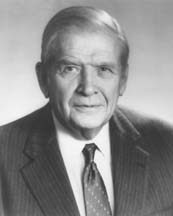Terry Sanford
| Terry Sanford | |
|---|---|
 |
|
|
United States Senator from North Carolina |
|
|
In office November 5, 1986 – January 3, 1993 |
|
| Preceded by | Jim Broyhill |
| Succeeded by | Lauch Faircloth |
| President of Duke University | |
|
In office 1969–1985 |
|
| Preceded by | Douglas Maitland Knight |
| Succeeded by | H. Keith H. Brodie |
| 65th Governor of North Carolina | |
|
In office January 5, 1961 – January 8, 1965 |
|
| Lieutenant | Harvey Cloyd Philpott (1961) |
| Preceded by | Luther H. Hodges |
| Succeeded by | Dan K. Moore |
| Chairman of the Senate Select Committee on Ethics | |
|
In office 1992–1993 |
|
| Preceded by | Howell Heflin |
| Succeeded by | Richard Bryan |
| Member of the North Carolina Senate | |
|
In office 1953–1955 |
|
| Personal details | |
| Born |
James Terry Sanford August 20, 1917 Laurinburg, North Carolina |
| Died | April 18, 1998 (aged 80) Durham, North Carolina |
| Resting place |
Duke Chapel Durham, North Carolina |
| Nationality | American |
| Political party | Democratic |
| Spouse(s) | Margaret Rose Knight |
| Alma mater | University of North Carolina at Chapel Hill |
| Religion | Methodist |
| Signature | |
| Military service | |
| Allegiance |
|
| Service/branch |
North Carolina Army National Guard |
| Years of service | 1942-1960 |
| Unit | 517th Parachute Infantry Regiment |
| Battles/wars | World War II |
James Terry Sanford (August 20, 1917 – April 18, 1998) was a United States politician and educator from North Carolina. A member of the Democratic Party, Sanford was the 65th Governor of North Carolina (1961–1965), a two-time U.S. Presidential candidate in the 1970s and a U.S. Senator (1986–1993). Sanford was a strong proponent of public education and introduced a number of reforms and new programs in North Carolina's schools and institutions of higher education as the state's governor, increasing funding for education and establishing the North Carolina Fund. From 1969 to 1985, Sanford was President of Duke University.
An Eagle Scout as a youth, Sanford became an FBI agent after graduating from the University of North Carolina at Chapel Hill in 1939. During World War II, he saw combat in the European Theatre and received a battlefield commission. Following his return to civilian life after World War II, Sanford attended and graduated from the University of North Carolina School of Law and began a legal career in the late 1940s, soon becoming involved in politics. A lifelong Democrat, he was noted for his progressive leadership in civil rights and education; although his opponents criticized him as a "tax-and-spend" liberal, Sanford is remembered as a major public figure of the South after World War II.
...
Wikipedia
